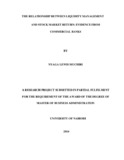| dc.description.abstract | Liquidity management which refers to the management of current assets and current
liabilities plays an important role in the successful management of a firm. It is a concept
that is receiving serious attention all over the world especially with the current financial
situations and the state of the world economy. Research has established that liquidity is
an important concept determinant of financial distress. If a firm does not manage its
liquidity well its current assets may not meet its current liabilities. Hence the firm may
not have external financing easily. The objective of this study was to investigate the
relationship between liquidity management and stock market return of listed commercial
banks in Kenya.
This study adopted a quantitative research design and the researcher chose to study the
commercial banks due to the availability and reliability of the data. This is because
liquidity is very crucial for commercial banks and it’s monitored keenly by bank
supervision department of CBK. The population of the study was all the 11 listed
commercial banks in NSE. Nine banks were used for this study after excluding I & M
bank since their data was not complete for five years because they were listed in 2012
and HFCK which is classified by CBK as a mortgage finance institution and its
regulation is assumed to be different from other commercial banks. Secondary data was
obtained from audited published financial statements, Central bank annual reports, NSE
website and NSE data vendors. To estimate stock return information on opening and
closing prices and dividends distribution throughout the year for five years between 2009
and 2013 was collected.
Stock return represents percentage gains or loss of value of the stock when compared to
some previous period and the capital gains. The same was done for liquidity component
for the same period. SPSS version 16.0 was used for data analysis. The average liquidity
and stock market return were compared for the period of five years under the study. Stock
market return was regressed against liquidity management to acquire the coefficient of
determination and asses the strength of the relationship.
The finding of this study shows that there exists a negative relationship between stock
market return and liquidity management of commercial banks in Kenya. Based on the
correlation coefficients at 95% degrees of confidence, the study coefficients are found to
be significant. The results of this study are consistent with the literature because many
studied have a shown there exist a tradeoff between liquidity and profitability of banks
affects the stock returns. This can be attributed to the fact that a stock price which affects
the returns fully incorporates publicly available information according to EMT. The study
recommends commercial banks should put in place good liquidity management
frameworks so as to remain viable to make returns for their investors and CBK should
monitor the liquidity of commercial banks continuously and report their findings to the
public who are major investors in bank stocks. | en_US |

